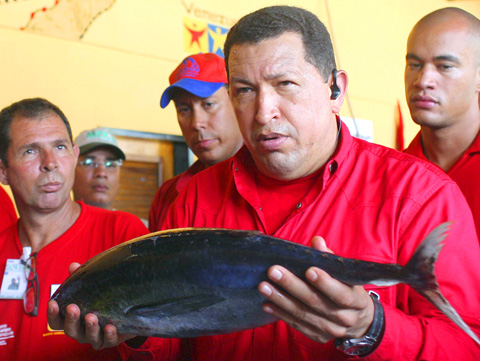Venezuelan President Hugo Chavez on Sunday threatened to expropriate the country’s largest steelmaker unless the soon-to-be-nationalized firm revises what he called its excessive demands for compensation.
Chavez dismissed a request made by Sidor’s parent company, Luxembourg-based Ternium SA, for US$4 billion in exchange for its 60 percent stake in the steelmaker.
“I’m not going to pay US$4 billion for that company,” Chavez said during his weekly radio and television program. “If they don’t want to reach an agreement with us, I’ll sign an expropriation decree. I’ll take immediate control.”

PHOTO : AP
Chavez ordered Sidor nationalized earlier this month, siding with workers who had sought improved salaries and benefits.
Ternium SA is controlled by Argentine-Italian conglomerate Techint Group. Ternium owns 60 percent of Sidor, while the Venezuelan government holds 20 percent. The remainder is held by current and former employees.
Venezuela was still negotiating the price it would pay to shareholders, but could expropriate the company outright if Ternium failed to reach a deal in a final meeting scheduled yesterday.
Officials had recently floated the possibility of buying a 40 percent share from Ternium to give the government a majority stake, while allowing Ternium and Sidor’s employees to each keep 20 percent of the venture.
But Venezuelan Mining Minister Rodolfo Sanz said last week that Ternium wants between US$3.2 billion and US$4.8 billion in exchange for its full 60 percent share.
Venezuela values Ternium’s stake at about US$800 million, but the government plans to pay even less after subtracting the company’s outstanding debts, Sanz said.
Sidor was privatized in 1998. It turns out about 85 percent of the 5 million tonnes of steel produced annually in Venezuela, the Belgium-based International Iron and Steel Institute said.
Chavez has made nationalizing major industries a centerpiece of his socialist agenda. His government last year seized majority control of the country’s largest telecommunications and electricity companies?nd of joint oil ventures previously run by some of the world’s largest oil companies.
Earlier this month, he announced plans to nationalize cement companies, including Mexico’s Cemex SAB, France’s Lafarge SA and Switzerland’s Holcim Ltd. The government is now negotiating sale terms with the companies, which will be allowed to stay on as minority partners.

MORE VISITORS: The Tourism Administration said that it is seeing positive prospects in its efforts to expand the tourism market in North America and Europe Taiwan has been ranked as the cheapest place in the world to travel to this year, based on a list recommended by NerdWallet. The San Francisco-based personal finance company said that Taiwan topped the list of 16 nations it chose for budget travelers because US tourists do not need visas and travelers can easily have a good meal for less than US$10. A bus ride in Taipei costs just under US$0.50, while subway rides start at US$0.60, the firm said, adding that public transportation in Taiwan is easy to navigate. The firm also called Taiwan a “food lover’s paradise,” citing inexpensive breakfast stalls

TRADE: A mandatory declaration of origin for manufactured goods bound for the US is to take effect on May 7 to block China from exploiting Taiwan’s trade channels All products manufactured in Taiwan and exported to the US must include a signed declaration of origin starting on May 7, the Bureau of Foreign Trade announced yesterday. US President Donald Trump on April 2 imposed a 32 percent tariff on imports from Taiwan, but one week later announced a 90-day pause on its implementation. However, a universal 10 percent tariff was immediately applied to most imports from around the world. On April 12, the Trump administration further exempted computers, smartphones and semiconductors from the new tariffs. In response, President William Lai’s (賴清德) administration has introduced a series of countermeasures to support affected

CROSS-STRAIT: The vast majority of Taiwanese support maintaining the ‘status quo,’ while concern is rising about Beijing’s influence operations More than eight out of 10 Taiwanese reject Beijing’s “one country, two systems” framework for cross-strait relations, according to a survey released by the Mainland Affairs Council (MAC) on Thursday. The MAC’s latest quarterly survey found that 84.4 percent of respondents opposed Beijing’s “one country, two systems” formula for handling cross-strait relations — a figure consistent with past polling. Over the past three years, opposition to the framework has remained high, ranging from a low of 83.6 percent in April 2023 to a peak of 89.6 percent in April last year. In the most recent poll, 82.5 percent also rejected China’s

PLUGGING HOLES: The amendments would bring the legislation in line with systems found in other countries such as Japan and the US, Legislator Chen Kuan-ting said Democratic Progressive Party (DPP) Legislator Chen Kuan-ting (陳冠廷) has proposed amending national security legislation amid a spate of espionage cases. Potential gaps in security vetting procedures for personnel with access to sensitive information prompted him to propose the amendments, which would introduce changes to Article 14 of the Classified National Security Information Protection Act (國家機密保護法), Chen said yesterday. The proposal, which aims to enhance interagency vetting procedures and reduce the risk of classified information leaks, would establish a comprehensive security clearance system in Taiwan, he said. The amendment would require character and loyalty checks for civil servants and intelligence personnel prior to